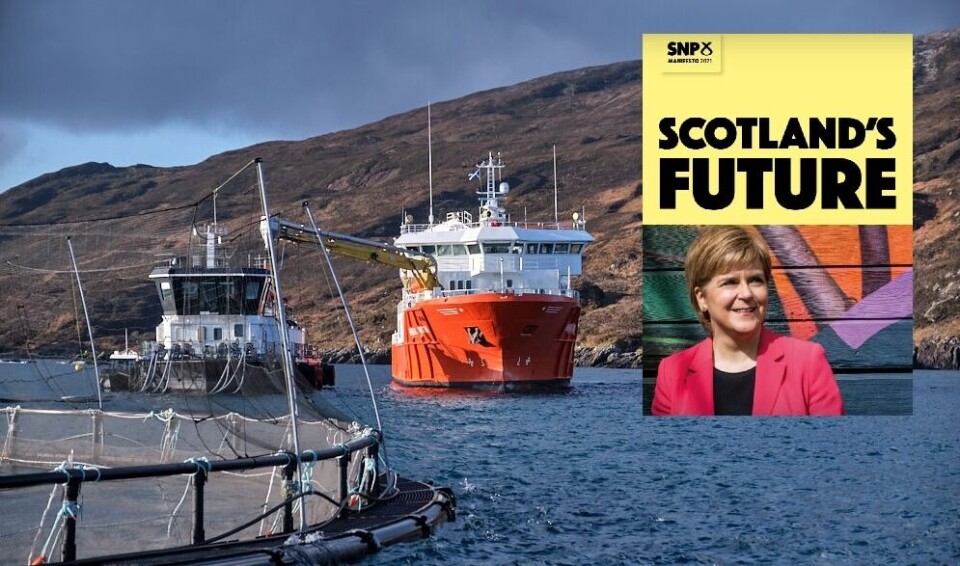
Councils won’t be shut out of fish farm decisions, says SNP
Local authorities will still play a part under the Scottish National Party’s plans for a one-stop-shop for fish farm consents, the party has told Fish Farming Expert.
Residents of local communities will also “continue to be engaged and have a role to play” under the scheme outlined in the SNP’s manifesto for next month’s Scottish Parliament election.
The SNP has promised to create a single determining authority for new farm consents modelled on the regulatory regime in Norway if it is returned to power on May 6.
One instead of four
This is likely to replace four of the regulatory organisations that currently have to approve fish farm applications – the Scottish Environment Protection Agency (SEPA), Marine Scotland, the Fish Health Inspectorate and local authorities, which must give planning permission.
Asked if such an approach might erode local democracy, the SNP stated: “The details of how to deliver this will be worked out in consultation with stakeholders, including the aquaculture industry.
“In Norway, there is still a role for local authorities, and we would want that to continue, not least because there are statutory provisions in this regard. But there is no doubt that the whole process could be streamlined and made more consistent and coherent and the new authority would be key to making this happen.”
A more strategic approach
Fish Farming Expert asked how areas suitable for salmon farms would be chosen, and whether members of the public would have an input in the way that they can now by supporting or objecting to planning applications.
“Current policy and legislation already guide this, not least through the marine protected areas (MPAs),” said the SNP. “There is a case for taking a more strategic planned approach to siting of farms in the future using the MPA network. Local communities would continue to be engaged and have a role to play.”
Auction system
The SNP’s manifesto states that it will expect producers to contribute much more to the communities that support them, “so we will also explore how a Norwegian-style auction system for new farm developments might generate significant income to support inspection and welfare services, provide real community benefit on islands and in remote rural areas and support innovation and enterprise”.
Asked what amount fish farmers might expect to pay, bearing in mind that they already pay a production-based lease fee to Crown Estate Scotland, the party said: “We are currently committing to exploring the potential for such a system and the details of the costs of any licence, and the interaction with existing licence measures, would be a key consideration.”
The manifesto also states: “We will support innovation in aquaculture, for example, by exploring the development of closed containment fish production on land and explore the potential to produce more shellfish in warm-water, land-based farms to cut the amount of unsustainably produced fish and shellfish being imported into Scotland.”
Explaining that further, the SNP told Fish Farming Expert: “Current practice of growing smolts (on land) would continue but we should also explore - as other countries are doing - the potential for full closed containment farming for other fish and shellfish species, not just or necessarily salmon.”
Novel technologies
Asked whether “support” meant financial help to establish hatcheries or on-land farms, the SNP replied: “We already fund the Sustainable Aquaculture Innovation Centre (SAIC) and would expect that financial support to continue.
“We would expect support to take a number of forms, including potentially financial. There is an obvious link between any funding raised from a future auction system and using it to support innovation and novel technologies, but all this would be determined by a future government.”
Asked if it had any particular species in mind when it talked about unsustainably produced fish and shellfish being imported into Scotland, the SNP said: “The global carbon footprint of warm water aquaculture is increasing, yet demand for produce like king size prawns, squid etc is buoyant. It makes sense to explore if there is potential for economic growth in this area here in Scotland and to determine if it could be done more sustainably, not least in cutting food miles.
“These commitments are to ensure that we continue to build and grow our expertise in aquaculture and to explore how to apply that to a range of fish products, so that Scotland stays a global leader in this field - and delivers high quality, sustainable healthy proteins which people want to eat.”






















































